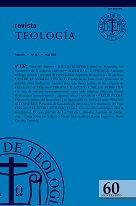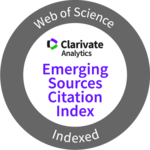The Gospel of John as a Generator of Great Theological Crises: Contributions for a New Reading of the Exegesis of Heracleon and Origen
DOI:
https://doi.org/10.46553/teo.59.137.2022.p59-78Keywords:
Gospel of John, Heracleon, Origen, Paradigms, Exegesis, CrisesAbstract
Today, Patristic Studies approach the exciting theological problems that arose in the first centuries of our era from new paradigms of analysis. In this sense, the existence of a diversity of currents in early Christianity is an indisputable fact for contemporary research, since there is no doubt that this pluriformity of positions arose from the diversity of interpretations of texts and theological notions. The classification of the various Christianities into “proto-orthodox or proto-Catholic, Judeo-Christian and Gnostic” that contemporary scholars have made is very useful for accessing a text such as Origen’s Commentary on the Gospel of John, to which we will refer on this article. But it must be further expanded, for Origen’s theology, while closer to what has come to be called proto-orthodoxy, has unique and distinctive characteristics with respect to other authors who are placed in this tradition. It was these unique characteristics that were so misunderstood by posterity and which ended up producing the condemnations of the Council of Constantinople in 553. As a foretaste of what we shall develop later, we shall call this Christianity mystical-esoteric.Downloads
References
Ayán Calvo, Juan José, De Navascués Benlloch, Aroztegui, Manuel.
“Filiación. Cultura pagana, religión de Israel,orígenes del cristianismo. Madrid: Trotta, 2005.
Bauer, Walter. Orthodoxy and heresy in earliest Christianity. Philadelphia: Fortress Press,1971.
Brakke, David. Los Gnósticos. Mitos, ritual y diversidad en el cristianismo primitivo. Salamanca: Sígueme, 2013.
Bertini, Daniele. Divenire Dio La teologia giovannea del maestro gnostico
Eracleone, Bologna: Emil di Odoya , 2010.
Brown, Raymond. El Evangelio de Juan (I-XII). Madrid: Ed. Cristiandad, 1999.
Brown, Raymond. El Evangelio de Juan (I-XII). Madrid: Ed. Cristiandad, 1999.
Brown, Raymond. La comunidad del discípulo amado. Salamanca: Sígueme, 2005.
Castagno, Adele. (Director). Diccionario de Orígenes. Burgos: Ed.
Monte Carmelo, 2003.
Castellano, Antonio. La Exégesis de Orígenes y de Heracleón a los Testimonios del Bautista. Chile: Pontificia Universidad Católica de
Chile, 1998.
Ciner, Patricia. Implicancias Teológicas y Místicas de la noción de Sabiduría en Orígenes. Mendoza: Publicación del Centro de Estudios de Filosofía y Letras, 2010. Año III, Nº 6.
Ciner, Patricia. La Exégesis Mística a los Testimonios del Bautista: Implicancias en la dilucidación de la identidad de Jesús, en Actas del Primer Congreso Internacional de Estudios Patrísticos: La identidad de Jesús: unidad y diversidad en la época de la patrística.
San Juan: Ed. Universidad Católica de Cuyo, 2012.
Ciner, Patricia. “Pensar y escribir desde un paradigma de la relacionalidad: El Comentario al Evangelio de Juan de Orígenes”,
en Adamantius 23, Annuario di Letteratura Cristiana Antica e di
Studi Giudeoellenistici. Roma: Editrice Morcelliana, 2018.
Ciner, Patricia. Orígenes, Comentario al Evangelio de Juan. Vol. N° 115.
Biblioteca de Patrística. Madrid: Ed. Ciudad Nueva, 2020.
Ciner, Patricia (trad). Orígenes, Comentario al Evangelio de Juan/2.
Vol. N° 116. Madrid: Ciudad Nueva, 2020.
Crouzel, Henri. Orígenes. Un teólogo controvertido. Madrid: BAC,
Ehrman, Bart. Los Cristianismos Perdidos: los credos proscritos del Nuevo Testamento. Madrid: Crítica, 2004.
Ehrman, Bart. Studies in the Textual Criticism of the New Testament.
Leiden-Boston: Scholars Press, 2006.
Downloads
Published
How to Cite
Issue
Section
License
Copyright (c) 2022 Teología

This work is licensed under a Creative Commons Attribution-NonCommercial-ShareAlike 4.0 International License.


















 Teología
Teología